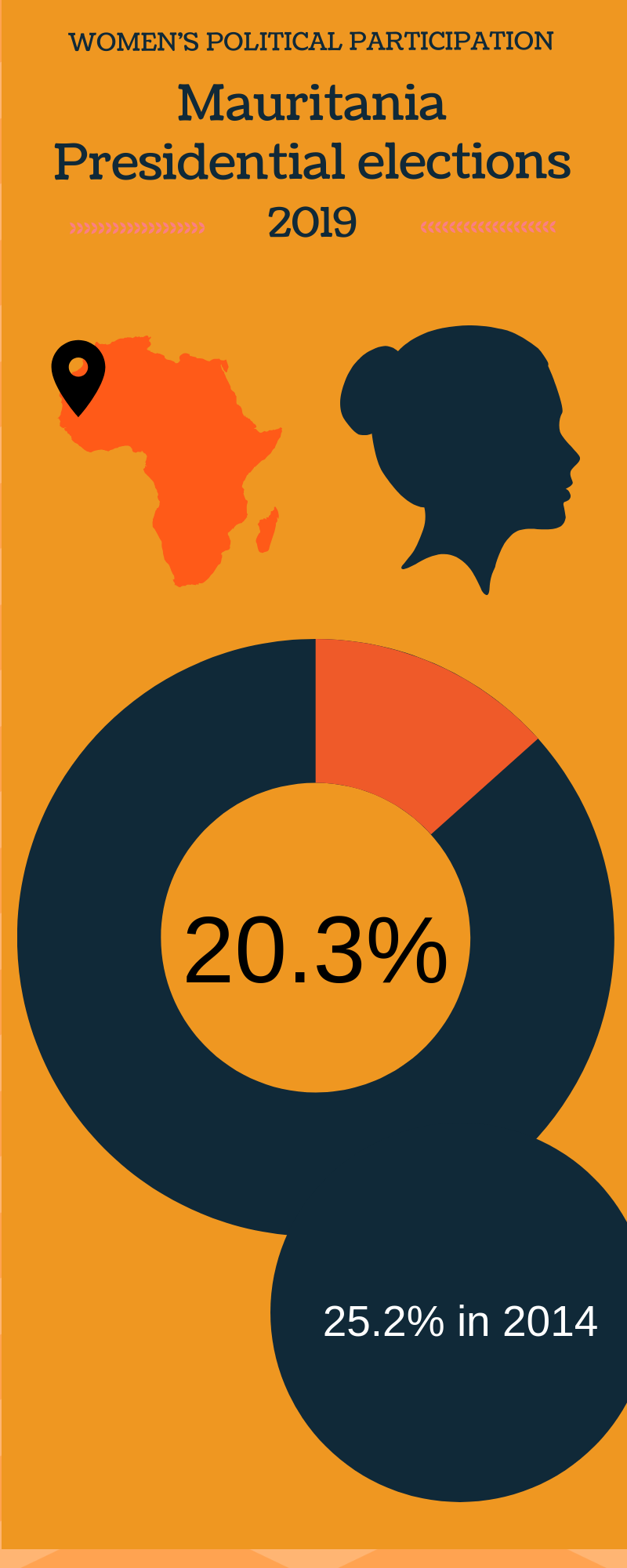Mauritania’s Parliamentary Elections took place in two rounds on 1st and 15th September 2018. Elections were held in 157 constituencies, each electing one member to the National Assembly (Al Jamiya Al Wataniya). There were two rounds of voting; 1st September and 15th September. The Union for Republic (UPR) party, led by Mohamed Mahmoud Ould Mohamed Lemine, became the largest party both in terms of popular vote and seats. Lalla Mariem Mint Moulaye Idriss was the only woman leader of a party in these elections, leading the Union for Democracy and Progress.
Mauritania has faced political instability and postponed elections. The 2014 elections marked the transition from military rule to democratic rule and the establishment of the Forum for the Preservation of Democratic Process (MFPDP). The MFPDP assisted the government in promoting social harmony, encouraging women’s participation in governance and promoting media freedom. Preceding the 2018 Parliamentary Elections, women held 37 (25.2%) seats out of 147 in the National Assembly.
The 147 members of the National Assembly are elected using two methods; 113 are elected using either the two-round system or proportional representation and the remaining 40 are elected from a single nationwide constituency, using closed list proportional representation. Half of these are elected on separate lists reserved for women. Union for the Republic now has 93 of the 157 seats on the National Assembly. Mauritania’s current head of state is President Mohamed Ould Abdel Aziz, who has been in office since 2009. An electoral law was passed in 2012 which reserved 20 seats for women running in the single nationwide list. In 2009, a quota of 20% of seats reserved for women in municipal councils was established.
Women’s Political Participation
Lalla Mariem Mint Moulaye Idriss was the sole female leader of a party in these elections. She served as Foreign Minister from 2009-2011, the first woman in Mauritania to head such a senior position. Her party received 4.34% of the vote. After the 2018 Parliamentary Elections, there are 47 female parliamentarians; 37 in the National Assembly and 10 in the Senate. Thus, women now account for 33% of all seats.
Women have maintained steady representation in parliament, only increasing slightly in 2014. Between 2010 and 2013 women held 22.1% of the seats in parliament. In 2014, women held 25.2% of the seats in parliament. This has now risen, as of September 2018, to 33%. Mauritania has been ranked by the Inter-Parliamentary Union as 68th out of 193 countries worldwide for the proportion of women holding parliamentary seats. Furthermore, the participation of women in ministerial positions peaked in 2017, with 30.8% of ministerial positions being occupied by women.
In Mauritania, politics continue to be male-dominated. This is reflective of a wider male-dominated society. There are still significant obstacles in place which ostracise women in politics. Politicians such as Aslamo Ould Sidi al-Mustafa, a presidential advisor, issued a fatwa in 2012 which banned women from contesting presidential elections; saying that their participation is ‘just for fun’. This technically means that no woman can be president of Mauritania. Furthermore, there is a lack of senior female politicians; Mint Moulaye Idriss is the only woman who has been given a senior ministerial position or run as a candidate in presidency elections. Society in Mauritania is ‘marked by the patriarchate concedes to the women’. Women who challenge patriarchal attitudes are often scorned. Furthermore, high levels of poverty and low economic participation among women are significant barriers to women’s political participation.
On 10th May 2001, Mauritania ratified CEDAW. In 2014, the Government of Mauritania partially withdrew its general reservation made upon accession. On 21st September 2005, Mauritania ratified the Maputo Protocol. To date, Mauritania has not adopted a National Action Plan for the implementation of UNSCR 1325. The country ranks 147th out of 159 countries on the UNDP Gender Inequality Index.
Conclusion
Overall, women’s political participation in Mauritania has progressed and quotas have made a difference. However, the country’s journey to complete gender parity within politics is often hindered by obstacles such as stigma and conservative customs and traditions.

